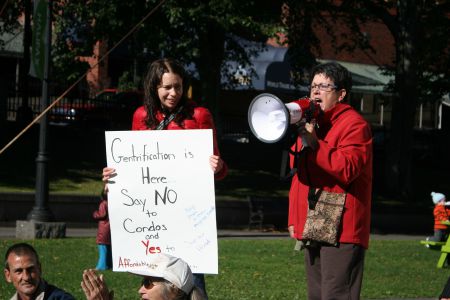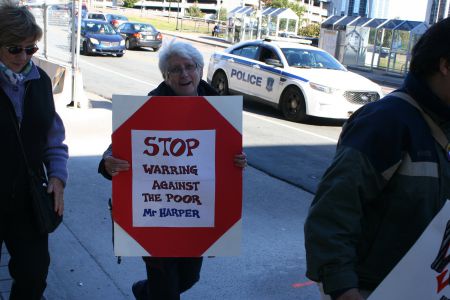KJIPUKTUK (Halifax) – People took to streets on Saturday in recognition of International Day for the Eradication of Poverty, a United Nations-sponsored annual event that in Halifax has been observed for many years now.
The hundred or so protesters, people living in poverty and their allies, marched from Halifax North End to the Grand Parade in downtown Halifax.
People on welfare in Nova Scotia struggle to make ends meet well below the poverty line, often in mouldy vermin-infested apartments, while nickel-and-dimed by Community Services. Nova Scotia's working poor are hardly better off.
“There is no reason for there to be poor people in Nova Scotia,” Amy Moonshadow, chair of the Community Advocates Network, told the crowd. “We are a province rich in resources, it's just a matter of how wealth is distributed.”
Adequate and affordable housing, a stop to gentrification, sufficient welfare rates and a $15 minimum wage were the demands of the group.
But whether anybody is listening remains to be seen.
Raising the welfare rates has been a consistent demand of people on welfare for a very long time. That became even more pronounced when the current provincial government broke with tradition and put a halt to an annual cost of living increase of welfare allowances.
A moratorium that will continue for the foreseeable future, Community Services minister Joanne Bernard told the CBC this week.
“I know an incremental change would help a lot of people, but it isn't going to change the system, and the system needs to change,” minister Joanne Bernard told the CBC this week, alluding to a reform of the welfare system that is mostly shrouded in secrecy.
The perils of gentrification were front and centre at this year's march. This August Harbour City Homes, a non-profit, announced that it was selling nine North End properties on Brunswick Street, no doubt to make room for condos and townhouses.
Affected tenants organized in order to hold on to their long-time homes and have been vocal in their opposition. Deborah Key, chair of the Brunswick Street Tenant Association, addressed the crowd.
“Gentrification is here and we have to do something about it. Right now we're losing over 40 units of low income housing,” said Key. “The people being moved an deported from their community, some have been there for 51 years.”
”If we sit back and allow it to happen we're going to be surrounded by condominiums and townhouses for the elite,” said Key.
The march was organized by a coalition of poverty advocacy groups, including the Community Advocates Network and the Benefits Reform Action Group.
Also at the march was Jackie Torrens, who recently launched her acclaimed documentary My Week on Welfare, offering a glimpse into the difficult lives of several Nova Scotia welfare recipients.
“If we don't deal with poverty it is going to cost us emotionally, spiritually and financially more than it would be if we stopped applying stereotypes,” Torrens told the Halifax Media Co-op.
“We need to have a real conversation about the issues, which is that many people live in poverty, that the system is inadequate, and that we need to raise the rates,” said Torrens.
Click here for more Halifax Media Co-op coverage of Community Services and social assistance issues.
Follow Robert DeVet on Twitter





